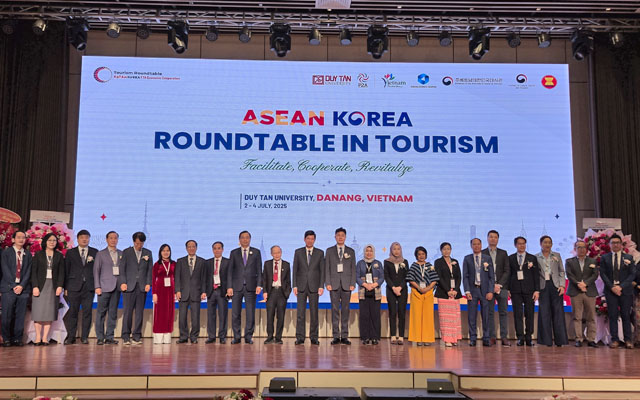Tourism officials from ASEAN member states and the Republic of Korea met in Danang, Vietnam, last week to explore ways to revive travel between the two regions following the Covid-19 pandemic.
The ASEAN-Korea Roundtable in Tourism (AK-RT 2025) was jointly organised by the Southeast Asia Tourism Development Center (SATDC), Duy Tan University, and Passage to ASEAN (P2A), with funding from the South Korean government under the Korea-ASEAN FTA Economic Cooperation Project.

The event focused on developing policy recommendations to support tourism recovery and economic cooperation under the ASEAN-Korea Free Trade Agreement.
The AK-RT initiative was first introduced at the 24th Meeting of ASEAN Plus Three Tourism Ministers in Johor, Malaysia, in January.
Before the pandemic, tourism contributed about 12 per cent of South-east Asia’s GDP and accounted for 11 per cent of employment, according to 2023 Organisation for Economic Co-operation and Development data. From 2010 to 2019, visitor arrivals from South Korea to South-east Asia countries grew by 11.7 per cent annually, while South-east Asia visits to South Korea increased by 10 per cent per year.
Kim Geun Ho, director general at Republic of Korea’s ministry of culture, sports and tourism, said: “Before the pandemic, nearly 13 million people travelled between our regions annually. This impressive figure reflects the connection between South Korea and South-east Asia.
“Now, as we recover from the impact of Covid-19, we face both challenges and opportunities. We must work together to create a more seamless, inclusive, and forward-looking tourism environment. This roundtable comes at a critical juncture calling for practical policy dialogue, deeper mutual understanding, and concrete solutions.”
Mo Chul Min, senior project manager of the AK-RT 2025 steering committee, added: “Tourism is one of the key sectors under the ASEAN-Korea Free Trade Agreement. The increased trade and investment flows under the FTA have enabled greater people-to-people connectivity between the two regions.
“ASEAN and (South) Korea are each other’s third-largest source markets for tourism. In 2024, ASEAN accounted for 15.4 per cent of (South) Korea’s total international arrivals, while (South) Korea represented 8.2 per cent of ASEAN’s inbound tourism in 2023.”
He noted that 2025 marks the 35th anniversary of ASEAN-Korea Dialogue Relations, now a comprehensive strategic partnership. He said the roundtable could help increase tourist flows between the two regions to 20 million, up from 13 million in 2019.
The roundtable focused on four areas: travel facilitation and security, addressing tourist inconveniences, workforce training, and cultural understanding.
Daniel Chong, dean of the school of hospitality and service management at Sunway University, Malaysia, pointed to data privacy concerns, varying levels of digital readiness across South-east Asia, and infrastructure costs as key obstacles. He pointed to data privacy, varying levels of tech readiness in ASEAN, and infrastructure costs as key challenges. His suggestions included bilateral data-sharing agreements, funding for digital border systems, and a regional task force to coordinate technology rollout.
To improve entry procedures, Nia Niscaya, senior advisor at Indonesia’s Ministry of Tourism, recommended expanding visa-free access based on reciprocity, piloting seasonal visa waivers, and introducing ASEAN-Korea youth cultural visas for students, exchange participants, and tourism apprentices.
Paithoon Monpanthong, former dean at the Graduate School of Tourism Management, National Institute of Development Administration, Thailand, highlighted job insecurity and limited professional growth in the tourism sector, especially in rural areas.
“During Covid-19 in Thailand, for example, the first job which was seriously affected was tour guides because more than 90 per cent of them were freelancers, making them feel it is not a stable career,” said Paithoon, adding that access to training is better in cities and suggesting online courses to support those in remote areas, as well as proposing improvements to workforce certification and multilingual promotion.
Pham Hong Long, dean of the faculty of tourism studies at VNU University of Social Science and Humanities, Vietnam, discussed cultural exchange and noted a disparity in perceptions. Citing an ASEAN-Korea Centre survey, he said 70 per cent of South-east Asian youth had a positive view of South Korea, while only 41.6 per cent of (South) Korean youth felt the same about South-east Asia.
“The Korean Wave (Hallyu) has significantly influenced ASEAN youth perceptions of (South) Korea,” he said, adding that this one-sided cultural flow needs to be balanced through reciprocal initiatives.
Each presentation was followed by discussions among tourism decision-makers and stakeholders to develop a joint recommendation, which is being finalised for submission to both governments.

















